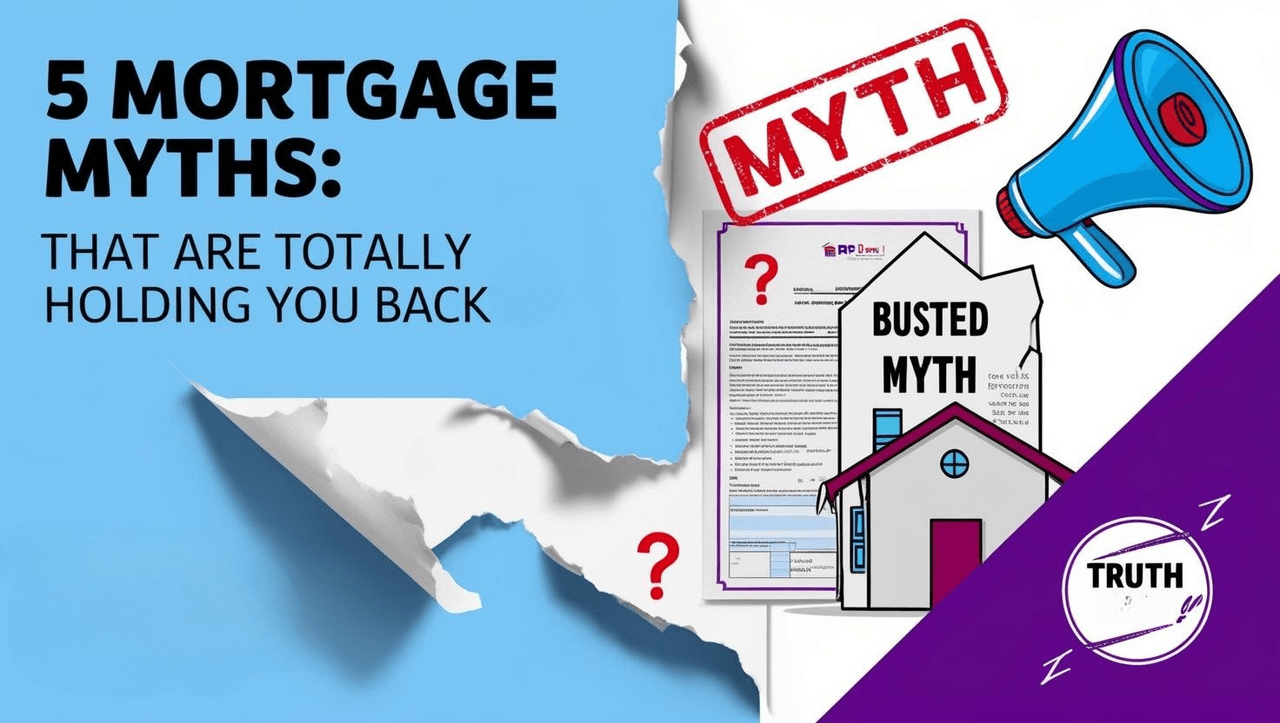When I first thought about buying a home, I was filled with excitement but also a hefty dose of anxiety. Like many people, I had absorbed a number of myths about mortgages that nearly paralyzed me. "You need 20% down to even think about it," I remember hearing over brunch, and it left me feeling like homeownership was a distant dream. In this post, I'm here to bust five pervasive mortgage myths so you can step into the world of home buying with confidence and clarity.
Myth #1: You Need 20% Down to Buy a Home
Have you ever heard someone say, “You need to put 20% down to buy a home”? It’s a common belief, but it’s simply not true. In fact, many loan programs allow down payments as low as 3%. That’s right! You don’t need to wait until you have a hefty savings account to make your dream of homeownership a reality.
Understanding Loan Options
Let’s break it down. There are various loan programs available that cater to different financial situations. For instance:
- FHA Loans: These loans are designed for low-to-moderate-income borrowers and allow down payments as low as 3.5%.
- VA Loans: If you’re a veteran or an active-duty service member, you might qualify for a VA loan, which can offer even lower down payment options—sometimes even zero down.
Waiting to save that elusive 20%? Think again. It could actually cost you more in the long run. With rising home prices, the longer you wait, the more you might end up paying. Have you considered how much rent you’ll pay while you save? It adds up!
The Real Barrier
As a homeownership advocate once said,
“The real barrier to entry in homeownership is not the down payment but the mindset of believing you need 20% before committing.”This statement resonates deeply. It’s not just about the money; it’s about your willingness to take that first step.
Why You Shouldn’t Wait
Here’s a thought: If you’re waiting to save 20%, you might miss out on the opportunity to buy a home that fits your needs. By the time you save that amount, home prices could rise significantly. So, what’s the solution? Understand the different loan types available to you. This way, you can find what suits your financial situation best.
Also, consider the impact of rising home prices on your savings timeline. If you keep waiting, you might find yourself in a position where you can’t afford the home you want, even with a 20% down payment.
Final Thoughts
In conclusion, don’t let the myth of needing a 20% down payment hold you back. Explore your options and take the leap into homeownership. It might be closer than you think!
Myth #2: You Need Perfect Credit to Get a Mortgage
Many people believe that having perfect credit is a must for getting a mortgage. But let’s bust that myth right now. The truth is, you can qualify for a mortgage with a credit score in the low 600s. Yes, you heard that right! In fact, some loan types may even allow for lower scores.
Understanding Credit Scores
Credit scores range from 300 to 850. Here’s a quick breakdown:
- 300-579: Poor
- 580-669: Fair
- 670-739: Good
- 740-799: Very Good
- 800-850: Excellent
So, if your score is in the low 600s, you’re not out of the game. Many lenders will still consider you for a mortgage. Isn’t that a relief?
Strategies Over Perfection
Now, you might be thinking, “Shouldn’t I wait until my credit is perfect?” Not necessarily. Having a strategy for improving your credit score can be more efficient than waiting for perfection. Here are a few tips:
- Pay your bills on time: Late payments can hurt your score.
- Reduce your credit card balances: Aim to use less than 30% of your available credit.
- Check your credit report: Look for errors and dispute them if necessary.
By focusing on these strategies, you can improve your score over time without putting your home-buying dreams on hold.
Better Credit Equals Better Rates
It’s true that better credit can lead to better interest rates. But don’t let that stop you from applying. Remember, “Perfect credit is a myth; what's important is knowing how to work with your current score to achieve your goals.” - Financial Advisor. This means that even if your score isn’t ideal, you can still find a mortgage that works for you.
Conclusion
A solid understanding of credit scores and their implications can help you navigate the mortgage process effectively. Don’t let the fear of not having perfect credit hold you back. You might be closer to homeownership than you think!
Myth #3: Renting Is Always Cheaper Than Owning
Many people believe that renting is the more affordable option. But is that really true? Let’s break it down.
The Cost Comparison
Owning a home can actually be cheaper over time. Why? Because of fixed mortgage payments. When you rent, your landlord can raise the rent. This means your monthly payments could increase every year. In contrast, with a fixed-rate mortgage, your payment stays the same. This stability can save you money in the long run.
- Fixed Payments: Your mortgage doesn’t change, while rents often do.
- Building Equity: Each mortgage payment builds your personal equity. Renting? You're paying someone else’s mortgage.
Benefits of Homeownership
Homeownership comes with several perks:
- Tax Deductions: Homeowners can often deduct mortgage interest and property taxes on their income tax returns.
- Customization: Want to paint your walls or remodel your kitchen? You can do that when you own!
These benefits add up. They can make owning a home not just a dream, but a smart financial decision.
Emotional Factors
Let’s not forget the emotional side of things. Owning a home can provide a sense of stability and belonging. It’s more than just a financial investment; it’s about creating a space that’s truly yours. Renting may feel flexible, but in the long term, owning typically offers more financial stability and investment value.
"Renting feels flexible, but in the long term, owning typically offers more financial stability and investment value." - Real Estate Expert
Analyzing Local Markets
It’s essential to analyze local rental versus mortgage markets. In some areas, renting might seem cheaper at first glance. But when you dig deeper, you might find that homeownership is more affordable than you think. Look at average rent versus average mortgage payments in key areas. This could change your perspective.
Also, consider the equity built over time. If you stay in your home for 5-10 years, you could accumulate significant equity. That’s money you can use later, whether for upgrades, investments, or retirement.
Understanding the long-term financial implications of renting versus owning can greatly impact your housing choices. It’s not just about the monthly payment; it’s about your future. So, before you decide to rent, think about what owning a home could mean for you.
Myth #4: It’s a Terrible Time to Buy a Home
Have you ever heard someone say, “Now is a terrible time to buy a home”? It’s a common myth that can hold many potential buyers back. But let’s break this down.
Market Conditions Fluctuate
First off, market conditions are always changing. Interest rates rise and fall. Home prices can spike or dip. There’s no universally 'perfect time' to buy a home. Waiting for the ideal moment might mean you miss out on opportunities. As a market analyst wisely said,
“Waiting for the perfect moment often results in lost opportunities; the right time is when you're prepared.”
Your Personal Circumstances Matter
What’s more important than market trends? Your personal circumstances. Are you financially ready? Do you have a stable job? These factors should guide your decision to buy. External headlines can create panic or fear. But your situation is unique. Ask yourself: Are you ready to take this step?
Work with Professionals
Another key point is the value of working with professionals. A good real estate agent can help you navigate the market. They can provide insights tailored to your needs. Together, you can develop a strategic purchase plan. This plan should align with your financial goals and lifestyle. It’s not just about buying a house; it’s about making a smart investment.
Trends in Housing Markets
Let’s look at some trends. Over the past few years, we’ve seen fluctuations in mortgage interest rates. For instance, historical averages show that rates can vary significantly. Understanding these trends can help you make informed decisions. If you wait for rates to drop, you might find that home prices have increased even more.
Aligning Goals with Market Realities
It’s crucial to align your personal goals with market realities. If owning a home is part of your long-term plan, don’t let fear hold you back. Instead, focus on what you can control. Your readiness to buy should be based on your financial situation, not the latest news headlines.
In conclusion, the idea that it’s a terrible time to buy a home is just a myth. The right time is when you feel prepared and have a solid plan in place. So, let’s not get caught up in the noise. Instead, let’s focus on what truly matters—your journey to homeownership.
Myth #5: Self-Employed Individuals Can’t Get Approved for a Mortgage
Many people believe that being self-employed makes it impossible to secure a mortgage. I get it—this myth is everywhere. But let’s clear the air. Self-employment might mean more paperwork, but it doesn’t mean you’re out of luck. In fact, there are viable loan options available for self-employed individuals.
Understanding the Process
When lenders evaluate self-employed applicants, they often focus on consistent income rather than traditional documentation. This means they may look at your tax returns or profit and loss statements instead of the usual pay stubs. So, if you’re self-employed, gather your necessary documentation. It’s crucial.
But what if your income fluctuates? That’s where creative financial solutions come into play. You might be surprised at how many options exist to help self-employed buyers succeed. For instance, some lenders may consider your business's overall performance rather than just your income in a single year. This flexibility can open doors for you.
Consulting the Right Specialists
It’s also important to consult specialists who understand self-employed scenarios. Not all lenders are the same. Some may have more experience working with self-employed individuals and can offer tailored advice. This can make a significant difference in your mortgage journey.
“Being self-employed is not a barrier; it's just a different pathway to explore in mortgage financing.” - Mortgage Consultant
Data Insights
Let’s look at the numbers. Each year, a significant number of self-employed individuals get approved for mortgages. Patterns in self-employed homebuyer success rates show that with the right approach, homeownership is absolutely achievable. So, don’t let outdated assumptions hold you back.
Final Thoughts
Understanding the nuances of mortgage applications for self-employed individuals can unlock homeownership opportunities. If you’ve been hesitant to pursue a mortgage because of your self-employment status, it’s time to rethink your position. You hustle hard, and you deserve the chance to build wealth through homeownership. Don’t let myths dictate your future. Instead, let’s explore the possibilities together.




